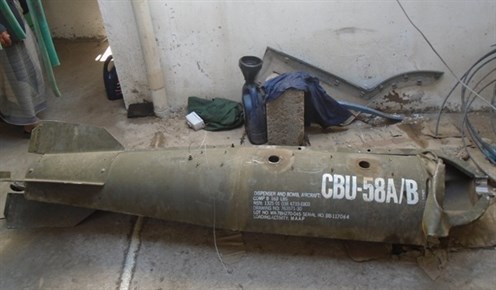07 January 2016
Saudi-led coalition strikes Yemen's capital with cluster bombs

Cluster bomb (CBU-58A/B) in AL Judairi Police Station, Sana'a, 6 January 2016, © OHCHR Yemen Country Office.
On 6 January 2016, Saudi Arabia-led coalition forces dropped cluster bombs on residential neighborhoods in Sanaa, Yemen’s capital city, reported Human Rights Watch. While civilian casualties have not yet been identified, the use of cluster bombs, an inherently indiscriminate weapon, in populated areas is a clear violation of international humanitarian law.
“Cluster bombs have been banned by 118 countries because they cannot discriminate between civilian and military targets,” said Megan Burke, Director of the Cluster Munition Coalition. “The use of cluster bombs in a densely populated area such as Sanaa shows complete disregard for human life. All members of the Saudi-led coalition should cease all use of cluster munitions and should be held accountable for war crimes associated with their use.”
Human Rights Watch, a founding member of the Cluster Munition Coalition, collected evidence of at least two aerial cluster bomb attacks in two different Sanaa neighborhoods on 6 January; a third attack, on Sanaa’s al-Thiaba neighborhood, was widely reported by social media but has not yet been confirmed.
Cluster munitions used in the attacks have been identified as US-made BLU-63 antipersonnel/anti-materiel submunitions and components of a CBU-58 cluster bomb. Each air-dropped CBU-58 cluster bomb contains 650 submunitions. Cluster munitions of this type were exported by the United States to Saudi Arabia between 1970 and 1995.
“As a party to the conflict in Yemen, the United States must also be held responsible for any war crimes in which its forces took part,” said Burke. “It must investigate this most recent and egregious use of weapons that have been outlawed by 118 countries through the Convention on Cluster Munitions.”
Since the start of the Saudi-led strikes on Yemen on 26 March 2015, cluster munition use has been documented on several occasions and, despite initial denials of any plans to use cluster bombs, the Saudis have admitted to their use. Civilian casualties were documented as a result of cluster munition strikes carried out between April and August. On 6 January 2016, the Office of the UN High Commissioner for Human Rights (OHCHR) issued a report sharing the evidence they have collected of strikes on several villages in Hajjah governorate. The 6 January strikes were the first identified on Sanaa, Yemen’s capital city. Both Human Rights Watch and OHCHR have collected photo evidence of the cluster bomb attack on Sanaa.
The Convention on Cluster Munitions bans all use, production, sale and transfer of cluster munitions. The Cluster Munition Coalition calls on all members of the Saudi-led coalition to stop all use of cluster munitions and join the Convention without further delay.
The Cluster Munition Coalition has sent a letter condemning these strikes and calling on Saudi Arabia to cease all use and join the Convention.
The Cluster Munition Coalition has also sent a letter urging the U.S. to demand that Saudi-led coalition members stop using cluster munitions. The letter also asks the U.S. to investigate its own role in the recent strikes and to cooperate with any independent, international inquiry into alleged violations of the laws of war by all sides.


